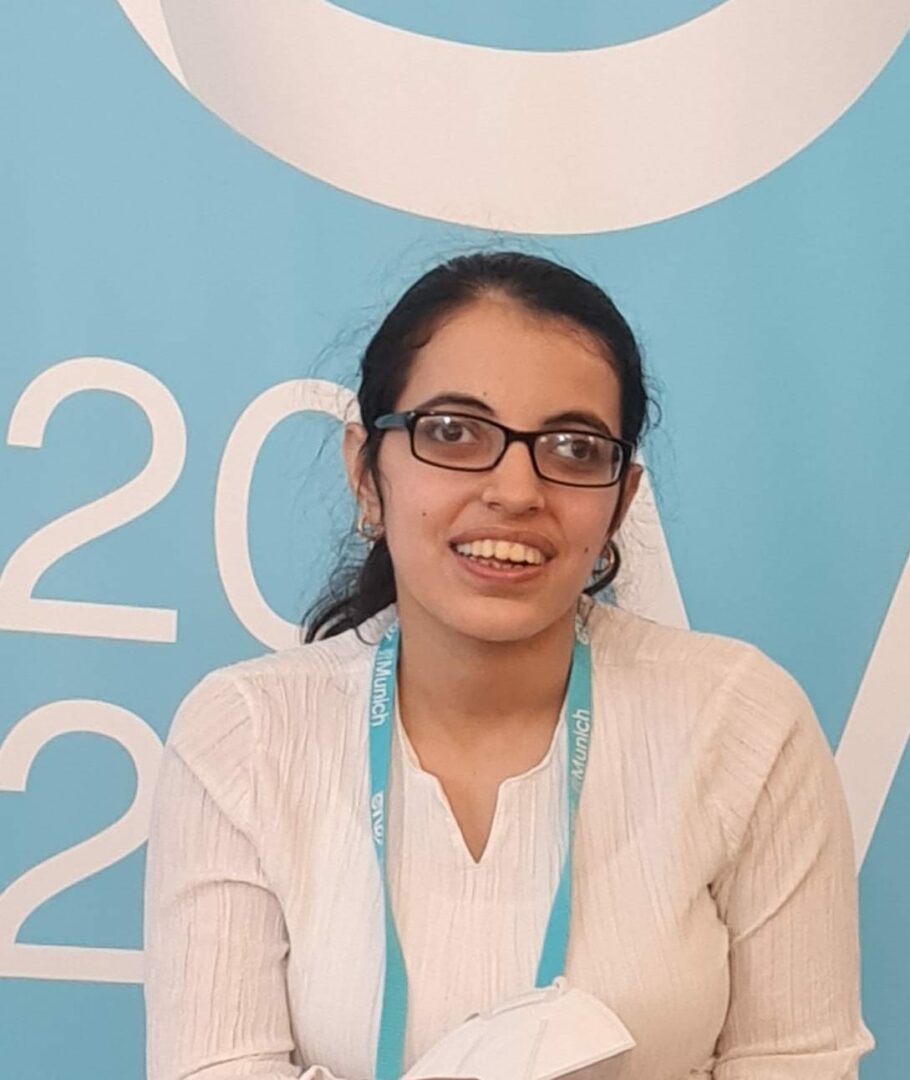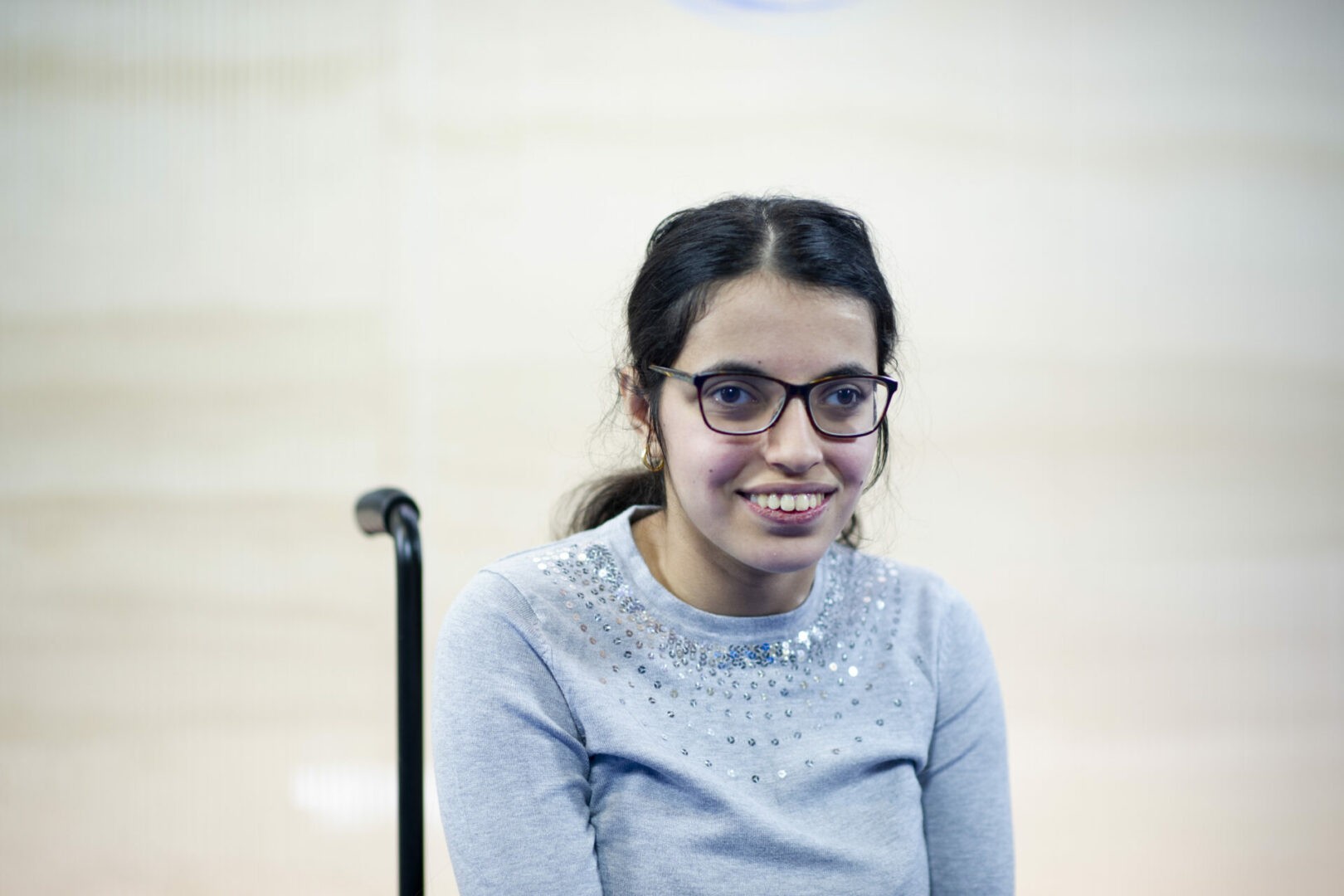Read more:
Nationality at birth: Syrian
Place of the fight for human rights: International Conferences, United Nations Security Council
| Area | Type | From | To | Location |
|---|---|---|---|---|
| Education | Neull-Breuning-College | 2015 | 2023 | Bad Honnef (Rhine) |
Leitmotif
Nujeen is a survivor of bombings in Syria, she took the risk of a dangerous flight to Germany in a wheelchair for a safe life away from the bombs. Since then, she has campaigned for the rights of people with disabilities and against bombing in residential areas – a practice that always claims numerous civilian victims in current armed conflicts.
How did the story become known?
On her 5,600 km long flight to Germany in a wheelchair, which took her across eight national borders, she attracted media attention and gave various interviews.
When did the story become known?
2015
Where did the story become known?
In an interview with journalist Fergal Keane from the BBC: https://www.bbc.com/news/av/world-europe-34275165
Prizes, Awards
2019: Alison Des Forges Award for Extraordinary Activism (Human Rights Watch)
Literature (literature, films, websites etc.)
Book:
Mustafa, Nujeen; Lamb, Christina (2016). “Nujeen: One Girl’s Incredible Journey From War-torn Syria In A Wheelchair”, HarperCollins.
Film:
The aid organisation Handicap International tells the impressive story of Nujeen Mustafa in a touching film by director Lara Brose: “Mit dem Rollstuhl auf der Flucht nach Europa: Ein Portrait von Nujeen Mustafa aus Syrien”
Ted Talks:
I Am Not a Number: A Refugee’s Tale, TedxExeter
My Journey from Syria to Germany in a wheelchair, TedxNishtiman
Right to life, freedom and security
Right to social security
Right to social security

INTRODUCTION
Nujeen Mustafa is a Syrian Kurdish woman who was born in Kobane (northern Syria) in 1999 with cerebral palsy and who grew up in Aleppo. Due to the increasing bombardment and shelling of her hometown, she initially fled to Turkey with most of her family in 2014. A year later, at the age of 16, she continued her flight to Germany, together with her sister. On this dangerous journey, they first crossed the Mediterranean Sea in an inflatable boat and a total of eight country borders by bus, train and on foot, with her sister pushing her wheelchair. Finally, they arrived near Cologne, where their brother already lived.
Since then, she has been fighting both in Germany and internationally as an activist for the rights of refugees with disabilities and against the bombing of residential areas. The use of explosive weapons in populated areas has becoming increasingly common in today’s armed conflicts. The reason for this is that conflicts are more and more moving into cities and other populated areas. The explosive weapons used in these conflicts invariably cause numerous civilian casualties due to their lack of precision and their large area of effect. Data from recent years has repeatedly shown that 90% of the victims of explosive weapons in populated areas are civilians.
Nujeen’s commitment to human rights is very multifaceted. It is particularly noteworthy that in 2019 she was the first person with a disability ever to be invited to speak at the United Nations Security Council. Based on her personal experience, she informed the council about the situation and needs of persons with disabilities in war and when fleeing.
THE STORY
Life in Syria
Nujeen grew up in the Syrian city of Aleppo and lived there with her family in a flat on the fifth floor – but without a lift. Therefore, a spontaneous meeting with friends or even visiting a school was impossible. The infrastructure in Syria is not designed for the needs of people with disabilities. In her speech to the United Nations Security Council, she reported that as a person with a disability in Syria, one is confronted with shame, discrimination and physical barriers and is often even hidden away. Fortunately, she has always been able to rely on her caring family. Despite not going to school, she learnt English completely by herself, namely by reading books and watching US soap operas and National Geographic documentaries. Nujeen describes her life before the war as follows: “It wasn’t perfect, but I loved it.”
The war changed everything abruptly: the situation on the fifth floor without a lift became not only an obstacle in everyday life, but a danger to life and limb. Nujeen writes in her book: “When the conflict broke out and the bombing started, I became very scared and nervous. I no longer felt safe in my own house. As the noise of the bombing got louder and louder, I also turned the TV up louder and louder. Unlike other people, I could not run away and hide. Since I lived on an upper floor without a lift, I couldn’t quickly reach the safe shelter in my wheelchair if we had to be evacuated.” For a safe future, a future away from the bombs, there was eventually only one option: to escape to safe Europe.
Flight
Together with part of her family, Nujeen initially fled to Turkey. For financial reasons, she had to leave her parents behind in Turkey and move on to Germany with her older sister Nisreen. She found accommodation with one of her brothers who had been living there for many years.
The flight to Europe regularly costs many refugees their lives, it is incredibly dangerous and marked by massive obstacles. Many people first cross the Mediterranean in makeshift boats. In her book, Nujeen writes: “Some call the crossing there riblat al-moot, death route. Either it led us to Europe or it swallowed us up”. In a wheelchair, the crossing is an even riskier undertaking: “I did not realise how close we were to death. All my wheelchair had to do was cause a small tear in the fabric of the boat and it would have filled with water and sunk”.
After crossing the Mediterranean, Nujeen and her sister arrived on the Greek island of Lesbos and the largest refugee camp there, Moria. A shelter without any infrastructure – unimaginable barriers for a person with disabilities. From there, the arduous journey continued: by train, bus, taxi or even on foot and across several national borders, Nujeen and her sister had to find new ways every day to reach their destination. Nujeen’s knowledge of English made it much easier for them to communicate on their long journey through Turkey, Greece and Eastern Europe.
Already during her flight, Nujeen gained media attention when she was interviewed by BBC journalist Fergal Keane. According to the United Nations High Commissioner for Refugees, her optimism and unwavering will – despite all the challenges – have made Nujeen the human face of a growing dehumanising crisis.

Image 1: Nujeen Mustafa, photo by her sister Nisreen Mustafa.
Life in Germany
At the end of 2016 – one year after her arrival – Nujeen was granted asylum in Germany. Since then, she has been living near Cologne, where she also went to school for the first time in her life. She attended a local vocational college until her Abitur exams in May 2023. In the meantime, the sisters were able to bring their parents to Germany. In addition to Kurdish, Arabic and English, Nujeen now also speaks fluent German and is currently learning Japanese.
Nujeen’s commitment to human rights
Since her arrival in Germany, Nujeen has been committed to the rights of people with disabilities here as well as on an international level. In Germany, she is involved as a self-advocate in the Crossroads project of the aid organisation Handicap International, which aims to improve the participation of refugees with disabilities.
Internationally, Nujeen has given numerous interviews as well as talks about her experiences as a young refugee woman with a disability: at the United Nations in Geneva, at TEDx in the UK, and in Iraq as a keynote speaker at the 2017 Nansen Refugee Awards ceremony. In 2019, she was the first person with a disability invited by the United Nations Security Council to teach its members about the situation of people with disabilities as a result of war and flight. In the same year, she received the Alison Des Forges Award for Exceptional Activism, presented by Human Rights Watch. It highlighted the importance of her life story in influencing policy makers in the European Union in the provision of humanitarian assistance to people with disabilities.

Image 2: Nujeen gives a statement at the signing conference of an international agreement to better protect civilians from bombardment and shelling of residential areas. © G. Lordet / HI
Nujeen also took part in a diplomatic negotiation process in which states negotiated an international agreement between November 2019 and April 2022 to limit the bombing and shelling of residential areas and to better protect civilians in armed conflicts in the future. In doing so, she appealed to the negotiating states to broker a strong text of the agreement with concrete measures for the protection of civilians. At the signing conference of the agreement in November 2022, she called on states to implement the international agreement and make a real difference for civilians in war.

Image 3: Nujeen laying a wreath in honour of civilians killed in armed conflicts. © G. Lordet/HI
Am selben Tag legte sie auf einer von Handicap International organisierten Veranstaltung zum Gedenken an die zivilen Opfer bewaffneter Konflikte einen Kranz nieder und hielt eine emotionale Rede zu Ehren getöteter Zivilist*innen: „Ihnen heute an diesem Denkmal zu gedenken und sie zu ehren, ist das Mindeste, was wir tun können. Wir erinnern nicht nur an die enorm große Opferzahl, sondern auch daran, dass hinter all diesen Zahlen Menschen stehen, geliebte Menschen, Mütter, Väter, Kinder, Freunde, die ihr Leben gelebt hatten, bevor die Grausamkeit des Krieges über sie hereinbrach. Sie alle sind unschuldig gestorben.“
On the same day, at an event organised by Handicap International to commemorate the civilian victims of armed conflict, she laid a wreath and gave an emotional speech in honour of killed civilians: “Remembering and honouring them today at this memorial is the least we can do. We remember not only the enormous number of victims, but also that behind all these numbers there are people, loved ones, mothers, fathers, children, friends, who had lived their lives before the cruelty of war fell upon them. They all died innocently.”
The quote at the beginning of this portrait of Nujeen comes from this ceremony. She feels it is her duty to tell her story over and over again, in the hope that she can contribute to improving the conditions for civilians and especially people with disabilities in war. Nujeen herself says she was very lucky that the media heard her voice during her flight. But not everyone is so lucky. Through her commitment, she would like to give a voice to others who are affected.
Author: Veronika Wies, Daniela Groksch
Contact: info@buxus-stiftung.de
Images:
- Header: © UNHCR
- Portrait: © Nisreen Mustafa
- Image 1: © Nisreen Mustafa
- Image 2: G. Lordet/Handicap International
- Image 3: G. Lordet/Handicap International
Sources:
Personal conversations with Nujeen Mustafa
Mustafa, Nujeen; Lamb, Christina (2016). “Nujeen: One Girl’s Incredible Journey From War-torn Syria In A Wheelchair”, HarperCollins.






